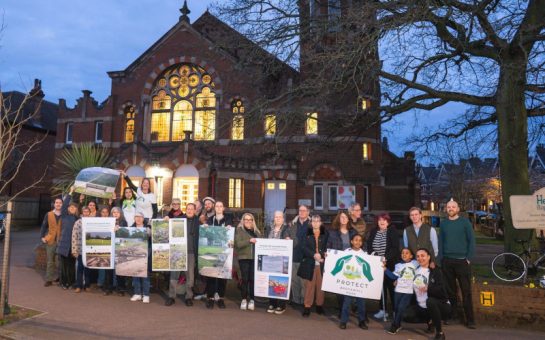The use of foodbanks has risen dramatically over the past year.

Foodbanks started to grow rapidly across the US in the 1980s as an immediate response to Reagan’s deep cuts into welfare provisions.
Three decades later, foodbanks across the country have become a long-term coping strategy for many Americans suffering a shortage of food, providing assistance to over 37 million inhabitants a year.
Is this how we see Britain in the future?
The use of foodbanks across Britain has risen dramatically over the past year and not because of homelessness but as a result of benefit cuts and high unemployment rates.
One London borough in particular has faced drastic cuts in various benefits, has the highest number of job seekers in the capital and one of the highest rates of child poverty across the country.
Lambeth Council has had to fight tough campaigns and make huge decisions as a consequence of deep welfare cuts and the rising rate of poverty across the borough.
The anxiety of rising poverty persuaded Lambeth Council to reluctantly make funding proposals to local foodbanks last year.
However, the foodbanks were hesitant in accepting financial help, and the council were equally cautious in supplying aid because reliance on foodbanks is not considered a long-term justifiable response to rising poverty.
Since then, the number of people relying on food aid has increased and Lambeth Mayor Cllr Mark Bennett has chosen foodbanks through the Trussell Trust as his chosen charity amidst fears of public hunger and poverty.
“I chose foodbanks as my charity because I felt there is a real problem at the moment as people are going hungry and are really struggling in Lambeth and elsewhere in London,” he said.
“So I wanted to make an immediate difference with my charity for the year.”
Cllr Bennett is raising donations of food which go directly to foodbanks and therefore straight to the people that need it.
At the same time he makes clear that although the existence of foodbanks at present is significant it is not the answer to food poverty in the long run.
“They are an immediate answer to a need, a problem, but it is for the government, both local and national to address the problems that cause food poverty,” he said.
The popularity of food banks comes in light of the recent alarming reports from Oxfam and leading foodbank charity, Trussell Trust.
The report says that over 500,000 people across the UK are now reliant on food aid and it predicts that the number will escalate in the near future.
One of the main reasons behind this dramatic increase is as a consequence of benefit payments being delayed, reduced or withdrawn altogether and changes to the benefit system.
Lambeth has had to face an extremely high number of benefit cuts since April which means that up to one in six residents will lose income as a consequence.
Council Leader, Lib Peck, said that she believes a responsible local authority has a duty to support and provide advice to its residents about important matters which will affect their income and quality of life.
She added: “We are deeply concerned that thousands of residents are still unaware of the big changes to benefits.
“Over 20,000 households in Lambeth face big reductions in financial support as a result of the government’s reduce funding for council tax support.”
However, the people of Lambeth have pulled together at such a difficult time with a number of foodbanks operating across the borough, providing financial advice and support as well as food.
One such food bank is managed by social worker Solomon Smith, 27, who set up his soup kitchen at Southwyck House, Brixton, in January and has since helped two people get back into work.
Solomon, who has been self-funding his kitchen, said that the number of visitors he has received since the cuts in April is not soaring but has increased.
The people that have gone to the kitchen have not been homeless but are families living at home who can’t afford food because of changes to the benefit system.
He said: “I think it is going to get worse from all these benefit cuts, we had a family come here who did not receive their benefits and said they had no money to feed their children.
“The more money you cut, the more people you put out of work, every action has a reaction, and I don’t think the reaction is going to be nice.”
The Trussell Trust has seen a 76% increase in the number of foodbanks launched since April 2012 and well-established foodbanks are showing significant rises in numbers helped during the last 12 months.
Chris Mould, Trussell Trust Executive Chairman, said: “The sheer volume of people turning to foodbanks because they can’t afford food is a wake-up call to the nation.
“Politicians across the political spectrum urgently need to recognise the real extent of UK food poverty and create fresh policies that better address its underlying causes.”
As a result of the cuts, Lambeth council are offering benefits advice and are urging residents to claim benefits they are rightly entitled to.
Cllr Bennett said: “It’s evident that people are struggling at the moment, and it’s just not food, it’s about providing support for people that are at their lowest ebb.
“And having visited a number of our foodbanks and some of the clients, I can vouch; they are people in extremely vulnerable circumstances.”
Only 4% of people turned to foodbanks because of homelessness last year, and a drastic number of people are being affected by the biggest reforms to the welfare state since it started and will continue to do so.
Does this then beg the question of whether the UK is becoming more like the US and will uncontrollably start relying on foodbanks as a long term solution to poverty than an immediate response?
Even the US in the 1980s did not consider foodbanks to be the final answer to food poverty.
Follow us @SW_Londoner




